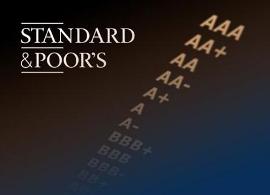Analytics, Financial Services, Investments, Latvia, Rating
International Internet Magazine. Baltic States news & analytics
Monday, 15.12.2025, 18:35
Standard & Poor’s raises Latvia's credit rating
 Print version
Print version |
|---|
Latvia’s transfer and convertibility (T&C) assessment has been revised from BBB+ to A-.
With this decision, Standard & Poor’s returns Latvia's credit rating to investment grade and it is important assessment of the country's economic development potential in general. Other international credit rating agencies – Fitch Ratings and Moody’s, have also granted the investment grade to Latvia.
“Latvia is currently in a truly unique situation since, during a time when economic activity in the European Union decreases and the credit ratings of most member states are reduced, our country's rating is raised. Standard & Poor’s welcomed Latvia’s development potential thanks to the joint effort of the government and businessmen, as well as the society's support to achieve balanced economy. Latvia currently differs from the rest of the EU, since our economy is expected to grow faster than in other member states this year, therefore Latvia will become more interesting to foreign investors and international companies,” says Finance Minister Andris Vilks (Unity).
Comment by Prime Minister V. Dombrovskis on the Standard & Poor's decision: "At a time when credit ratings of other European countries are lowered, the positive trends in the Latvian economy are evaluated with a rating increase. Standard & Poor is the last of the world's most influential rating agencies that has raised the credit rating of Latvia up to the investment grade. An increase in credit rating is an important signal for the development of the Latvian economy; it reduces the loan servicing costs and promotes foreign investments.
The pace of Latvia's economic development is more rapid than expected, as evidenced by the data of Q1 2012 on the implementation of the state budget – the consolidated general government deficit has decreased by LVL 121.7 million. At the same time, there is the need to adhere to strict fiscal discipline. Further tasks are strengthening of national competitiveness and reduction of inflationary pressure with the aim to meet the Maastricht criteria for joining the euro zone in 2014".
Standard & Poor’s points out that its decision is based on the fact that the political environment and fiscal discipline in Latvia was improved during the previous period, since Latvian remained committed to its fiscal targets, reducing general government deficit to 3.5% of gross domestic product (GDP) in 2011, compared to 8.2% of GDP in 2010.
The agency states that recent political reforms and the government’s commitment should strengthen political accountability and fiscal discipline over the medium term, as well as the economy’s flexibility and export share increases in GDP.
The recent electoral reforms – on making Saeima voting procedures more transparent, limiting political advertising and introducing state funding to political parties – will strengthen political accountability and improve the policy environment in Latvia.
Standard & Poor’s welcomes the government’s planned fiscal discipline law, which includes requirements to balance the budget over the economic cycle and establish ceilings on nominal spending. The law will likely come into force by mid-2012 and will anchor spending growth. The agency expects the government will meet its deficit target of below 3% of GDP for 2012 and continue to reduce Latvia's budget deficit over the medium term.
The stable outlook indicates about the agency’s view of on-going private sector de-leveraging and improved fiscal and inflationary performance against the risk that the government's fiscal consolidation commitment may reduce and that parent banks may limit their operations in Latvia.
Standard & Poor’s could raise the ratings if the private sector continues to de-leverage externally and fiscal and inflationary performance is consistent with the euro zone's criteria. The planned accession to the eurozone and access to the European Central Bank (ECB) and other lending instruments would reduce Latvia’s external financing risks and improve the country's monetary flexibility.








 «The Baltic Course» Is Sold and Stays in Business!
«The Baltic Course» Is Sold and Stays in Business!

